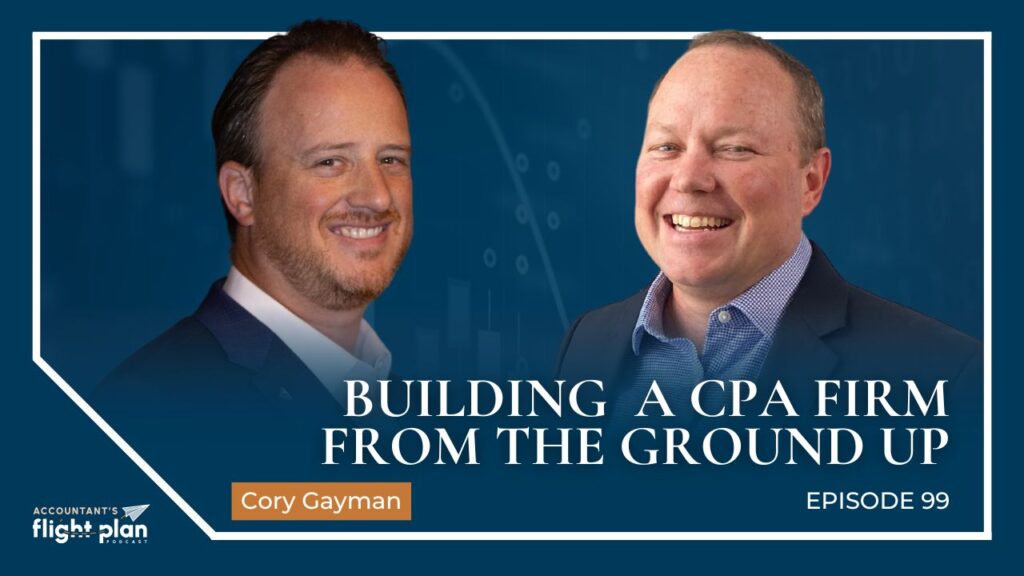Tips On Leading Successful Growth & Change in a CPA Firm
This column –which is a case study of sorts- was written in cooperation with Robert Siegfried Jr., CPA who is the CEO and Founder of The Siegfried Group – a leading, national CPA firm. Rob has created an incredible firm in a relatively short period of time, and was generous enough to share the major (and unconventional) factors that he attributes to his incredible growth. Enjoy!
I recently had an exciting conversation with Rob Siegfried, a CPA who has grown his firm over the past 28 years from a start-up practice with no existing clients into a national firm with more than $100 million in annual revenues. I wanted to see what insights Siegfried, founder & CEO of The Siegfried Group, LLP, has gathered during this time. Based on the obstacles that we have witnessed in talking with other CPA’s, his solutions confirm our observations.
So what would it take for other high potential CPA entrepreneurs to grow their practices from essentially a startup into a $100 million firm?
I’ll start with Rob’s story of meeting a seasoned executive who had an integral role in Rob’s growth. One day early in his career, Rob entered the coffee room of his practice and a man in his sixties stopped to talk with him. Actually, the man grabbed his arm and said “some businesses need sizzle and some need steak to thrive, and from what I can tell, you’ve got both here.” Rob was taken aback by this older gentleman’s fervor. He figured he was an individual tax client that he hadn’t met, but he was actually a family friend of one of his employees. He later learned this man was Carl Turner, a recently retired executive from GE who had worked with none other than Jack Welch. They began a great business relationship where Carl coached and mentored Rob. Carl helped Rob implement a few very big concepts, which helped Rob significantly transform the trajectory of his firm. Carl’s advice was not based on an accounting career so some of the strategies were, and are, unconventional to CPA practice management.
Siegfried said that Turner taught him three primary roles every true business leader (CEO) must focus on: strategic direction, protecting the underbelly and team development.
Focusing on these three roles is NOT a part-time job. More than 20 years ago, Turner advised Siegfried that to really grow his firm beyond three partners, he had to do the almost unthinkable and give up all of his billable client work. This was almost unheard of at the time. (Rob eventually shifted from 1,000 billable hours down to zero, where he has been for the past 12+ years.) It takes time to develop and nurture the vision, strategy, culture, values, leadership, talent, structure and systems that are needed to grow successfully. But when leaders don’t spend enough time on these key areas, because they’re still directly focused on attracting and serving clients, they often fail to properly lead growth.
Three Roles of an Accounting Firm Leader
- Strategic direction: This involves developing and communicating the vision for the firm to the team. This process will determine what services are offered, what sort of clients are targeted, what differentiates the firm from its competition, what markets and cities are targeted, etc.
- Protecting the underbelly: Identifying and protecting the Firm from any significant risks to the business.
- Team development: Developing the other key leaders within the organization, including the other partners, and ensuring that they are truly aligned with the firm’s strategic direction and higher purpose.
Dedicate Yourself to Accounting Firm Growth
The firm’s leader(s) must really want high growth. Some people are more wired for change than others. Many CPAs’ motivation for owning a practice is to help clients, make a reasonable living, and stay comfortable. That’s what’s right for them, and if they try to force themselves to grow beyond what they’re comfortable with, they will struggle.
The ambition to change and grow has to come from within. It takes courage to manage change in any organization. It’s not for the faint of heart. There has to be a strong desire to grow in order to tolerate the bumps in the road. Many practitioners are happy running smaller firms that are quite successful. You really have to want to pursue growth, and have the courage to do it, or it’s not going to happen. Leaders also have to be able to live outside their comfort zone, and they have to be willing to challenge those who report to them to also move beyond their comfort zones. Growth by its very nature creates change, and change is often uncomfortable and includes risk.
Transition Your Managerial & Technical Work to Leadership Work
The leader must be able rise above the details. Getting pulled back into details can be incredibly frustrating. In fact, growth that isn’t managed can be overwhelming. Many firms end up growing in a manner that is under planned and/or under focused. The most common roadblock to growth is that owners continue to hold on to too much technical and/or managerial work and ignore the true leadership responsibilities that fuel growth. Many accountants go into the field because they are drawn toward technical work. Good technicians tend to be somewhat perfectionistic and unfortunately the qualities that create initial success, don’t serve well in leading to the next level. Growth is risky and often prone to some mistakes. Going from technician to leader requires the leader to do less managerial and technical work, and more leadership work, to grow successfully. Continuing to be the primary rainmaker and/or provide billable hours yourself will only get you so far, if you are the leader of your Firm.
Reevaluate CPA Firm Ownership Structure
Some very intelligent people are predicting that technology will cause major disruption in the professions – and sooner than you might think. The winds of change are picking up and accountants are going to need to be able to adapt rapidly. In this new environment-NOT changing will be the risky approach. For a deeper dive of this topic, check out The Future of the Professions: How Technology Will Transform the Work of Human Experts.
Having an ownership structure that will facilitate change is going to be more important in the future. (Rob has maintained the controlling interest in his firm as he has grown.) Leaders won’t be able to allow management by committee to stifle change. This has always been true, but is becoming more critical than ever. Management (or “leadership”) by committee is often ineffective when it comes to implementing change because people get into comfort zones and many on the committee often attempt to eliminate all risk, especially when it requires them to change personally. This leads to a focus on preservation – instead of successful growth through transformative change. When you put a group of smart people together that are threatened by change, they can develop a long list of why not to do something. If the “no’s” win more often than not – then this will limit change in an effort to maintain that comfort zone.
Fewer Decision Makers is More Effective for Change & CPA Firm Growth
How firm leaders address this problem usually depends on their ownership structure. While Siegfried has partners, over the years, he has made sure that he maintained the controlling interest in his firm to ensure he could be a more effective change agent – able to be an empowered CEO who could more clearly determine the firm’s growth. He believes this clear CEO authority and responsibility has allowed him to move more boldly and quickly from a strategic leadership perspective. If the CEO does not have the controlling interest, then at least the CEO’s role and authority cannot be at the direction of those he or she is responsible for leading; otherwise, asks Siegfried, “who is really in charge?”
Siegfried is adamant that having one person in charge has been a key driver that helped lead to his firm’s growth. It was the right choice for him. Some firms, of course, operate under a different approach. When many partners share leadership, effectively and efficiently developing partner buy-in for implementing change is essential, but also can be challenging at best. The firm must have an unusually collaborative leadership team.
CPA Firm Leadership Development
Leadership development is one of the most important factors for successful CPA firm growth. The growth and success of every accounting practice reflects the development of its leadership. Our observation has been that there are natural points (ceilings of turbulence if you will) that have to be blasted through in order to get serious growth traction.
Good mentors can help develop the mindsets needed to grow. In fact, growing requires mindsets that often seem paradoxical. The leader has to learn to do less, not more, in order to grow successfully. More work and more billable hours will only get you so far. Once the leader reaches the limits of their own reach with a small team, they cannot continue to grow without a change in leadership strategy and organizational structure. Each stage requires a different amount of letting go.
Leadership & Courage Will Grow Your CPA Firm
It’s not for the faint of heart. Firms that grow share some commonalities that are worth noting. They are led by ambitious owners that are comfortable implementing and facilitating change who have the right combination of ambition, courage and humility. They have a strong desire to grow in order to tolerate the bumps in the road. They are able to get uncomfortable – or as Rob would say, “You must learn to be comfortable, being uncomfortable.” The owners go through a series of letting go, which allows them to focus on the higher-level leadership initiatives. The more a Firm’s leader is able to let go of both getting and serving clients, the more likely the Firm is to be able to grow.
If implementing these concepts were easy, then anyone could build a national firm. Developing the necessary mindsets and leadership skills to scale any business requires a significant investment of time and energy over a long period of time. The leader must be dedicated to the pursuit of lifelong learning, and be authentically humble, in order to succeed. This is what allowed Rob to truly receive Carl Turner’s message many years ago.
If you are ready to grow your firm by acquiring a new CPA firm, Poe Group Advisors can help.





